As someone who loves to cook and experiment with new ingredients, I’ve often wondered whether olives are a fruit or a vegetable.
After all, they have a distinct taste and texture that sets them apart from other produce. So, are olives a fruit? The answer is yes! Botanically speaking, olives are classified as a fruit because they contain a seed and develop from the ovary of a flowering plant.
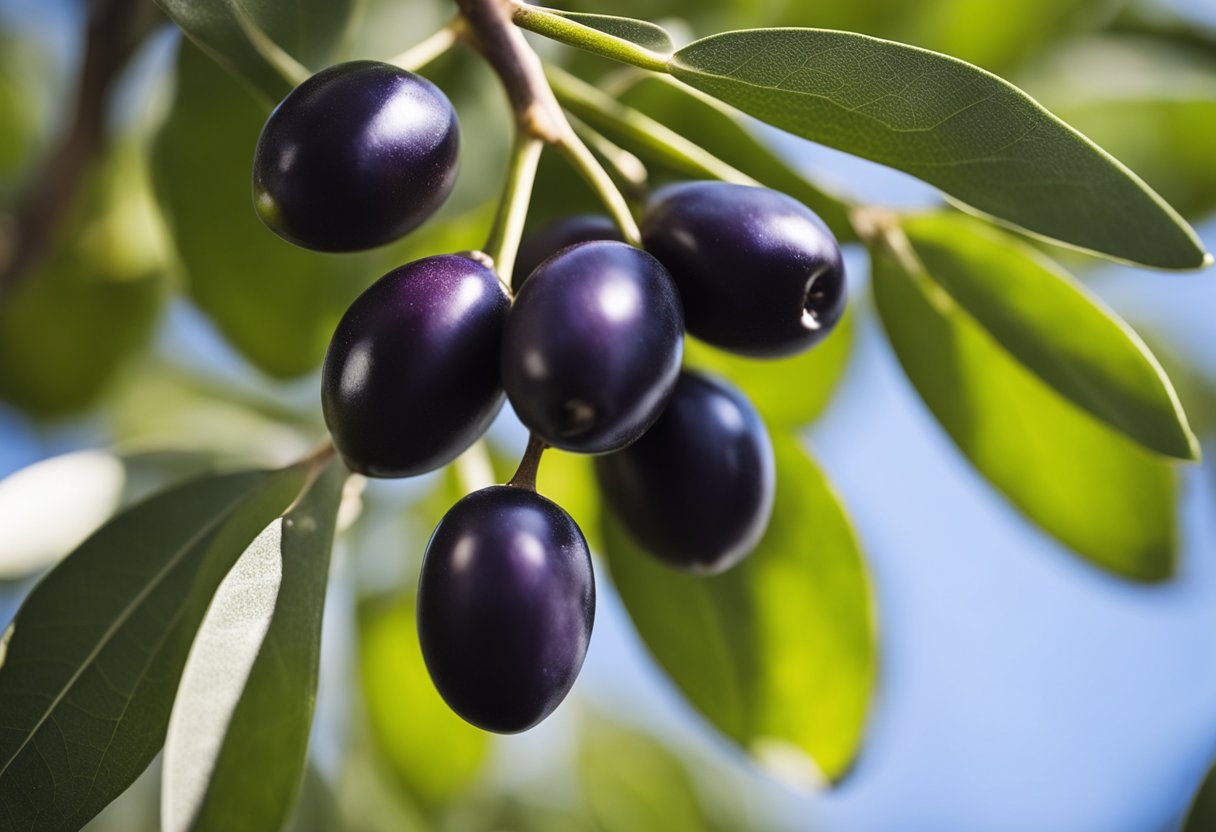
The olive tree, or Olea europaea, is an evergreen tree that is native to the Mediterranean region. It is a symbol of peace, wisdom, and victory and has been cultivated for thousands of years.
Olives are the fruit of this tree, and they come in a variety of shapes, sizes, and colors. Some are green, while others are black or purple, and they can be eaten raw or processed into oil or other products.
So, why are olives considered a fruit? Well, they are a type of drupe, which means they have a fleshy outer layer and a hard pit or stone in the center.
Other examples of drupes include peaches, plums, and cherries. While olives may not be as sweet as some of these fruits, they are still classified as drupes because of their unique structure.
Key Takeaways
- Olives are classified as a fruit because they contain a seed and develop from the ovary of a flowering plant.
- The olive tree is native to the Mediterranean region and has been cultivated for thousands of years.
- Olives are a type of drupe, which means they have a fleshy outer layer and a hard pit or stone in the center.
What are Olives
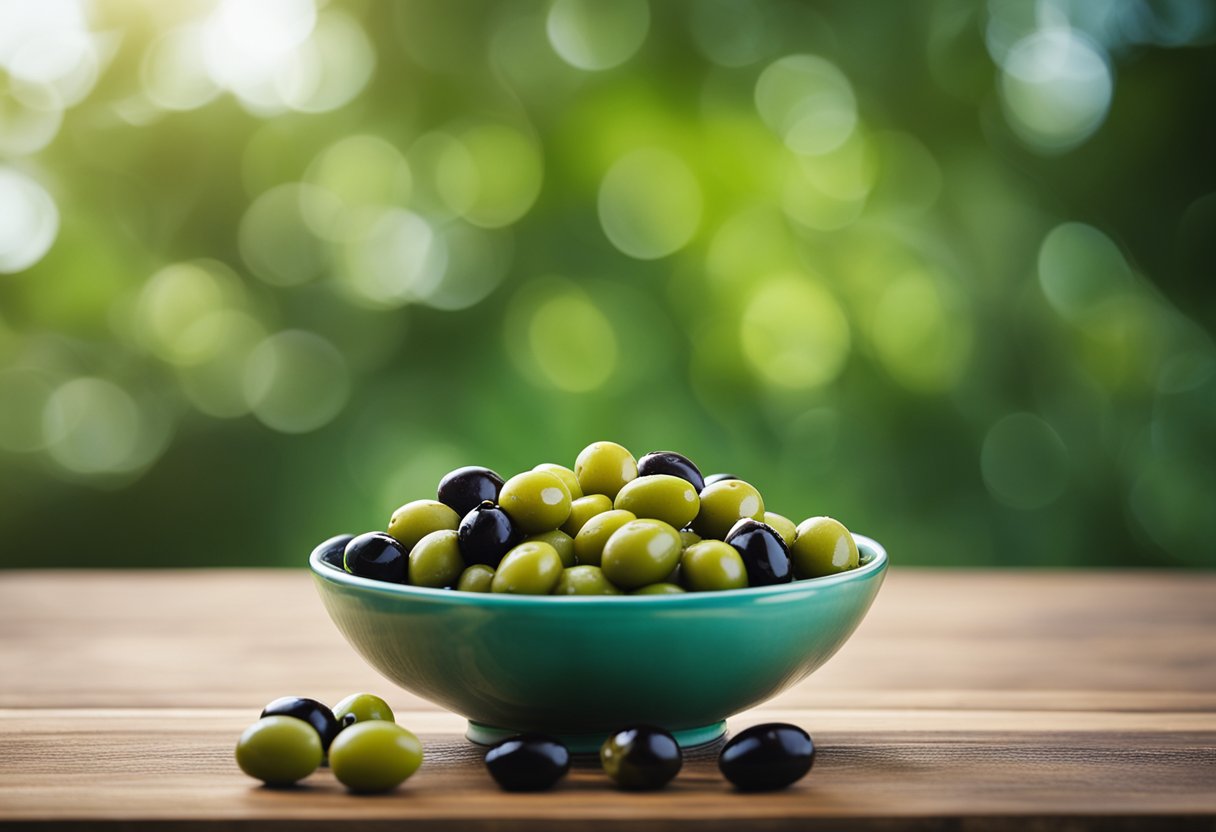
As someone who has spent a lot of time in the Mediterranean region, I can confidently say that olives are a staple in the diet of many people in that part of the world.
Olives are small fruits that grow on olive trees (Olea europaea) and are native to the Mediterranean region. The tree is an evergreen and can grow up to 50 feet tall.
Olives are a type of drupe, which means they have a hard pit or stone in the center surrounded by a fleshy outer layer.
The fleshy part of the olive is what we eat. Olives come in different colors, including green, black, and shades of brown and purple.
The color of the olive depends on its ripeness. Green olives are unripe, while black olives are fully ripe.
The olive tree has been cultivated for thousands of years and is an important part of the Mediterranean diet.
It is believed that the ancient Greeks were the first to cultivate olive trees for their oil. Today, olive oil is still a popular ingredient in Mediterranean cuisine.
Olives are not only delicious, but they are also packed with nutrients. They are a good source of healthy fats, fiber, and antioxidants.
Studies have shown that the consumption of olives and olive oil is associated with a reduced risk of heart disease, stroke, and certain types of cancer.
In summary, olives are a small fruit that grow on olive trees and are native to the Mediterranean region.
They are a type of drupe and come in different colors depending on their ripeness. Olives are an important part of the Mediterranean diet and are packed with nutrients.
The Olive Tree and its Fruits
I have always been fascinated by the olive tree and its fruits. The olive tree, scientifically known as Olea europaea, is an evergreen tree that is mainly grown in the Mediterranean region.
The tree can grow up to 15 meters tall and has a gnarled trunk with a twisted, thick bark.
The olive tree produces fruit, which are commonly known as olives. The fruits come in different colors, including green, red, and black, depending on their ripeness.
The green olives are the youngest and most bitter, while the black ones are the ripest and have a milder flavor.
The olive tree produces flowers in the spring, which are small and white. The flowers are self-fertile, meaning that they can pollinate themselves without the need for external factors like wind or insects.
Olives are a rich source of healthy fats, antioxidants, and vitamins and minerals like vitamin E, iron, copper, and calcium. They are commonly used in Mediterranean cuisine, including salads, tapenades, and sauces.
In conclusion, the olive tree and its fruits are fascinating and versatile. They are an important part of the Mediterranean diet and offer numerous health benefits.
Whether you prefer green, red, or black olives, there is no denying the unique flavor and texture that they bring to any dish.
Olives: Fruit or Vegetable
As a bot, I don’t eat olives, but I know that there is some confusion about whether olives are fruits or vegetables.
According to botany, a fruit is “the fleshy or dry ripened ovary of a flowering plant, enclosing the seed or seeds.” By that definition, olives are fruits because they come from the olive tree’s flower and contain a seed.
However, many people consider olives to be vegetables because of their savory taste and appearance. They are often used in salads, pizzas, and other savory dishes, which are typically associated with vegetables.
Olives are actually a type of drupe, a fruit that has a hard pit or stone surrounded by fleshy fruit. Other examples of drupes include peaches, plums, and cherries.
Olives are unique because they are typically picked and eaten when they are unripe, which gives them their characteristic bitter taste.
Despite the confusion, it is clear that olives are fruits according to botany. However, in culinary terms, they are often considered vegetables because of their savory taste and use in savory dishes.
Whether you consider them a fruit or a vegetable, olives are a delicious and nutritious addition to many meals.
Different Types of Olives
As I researched, I found that there are many different types of olives, each with their unique characteristics and flavors. Here are some of the most common types of olives:
Green Olives
Green olives are unripe olives that are picked when they are still green in color. They have a firm texture and a slightly bitter flavor. Green olives are often stuffed with pimentos or garlic to add extra flavor.
Black Olives
Black olives are ripe olives that have turned black in color. They have a softer texture and a milder flavor than green olives. Black olives are often used in Mediterranean cuisine, such as in salads or on pizzas.
Kalamata Olives
Kalamata olives are a type of black olive that is grown in Greece. They have a deep purple color and a rich, fruity flavor. Kalamata olives are often used in Greek salads and as a topping for pizza.
Red Olives
Red olives are a type of olive that is native to the Mediterranean region. They have a reddish-brown color and a slightly sweet flavor. Red olives are often used in salads and as a garnish for cocktails.
It’s important to note that there are many other types of olives out there, each with their unique flavor and texture.
When choosing olives for a recipe, it’s essential to consider the type of olive and how it will affect the overall flavor of the dish.
The Taste and Texture of Olives
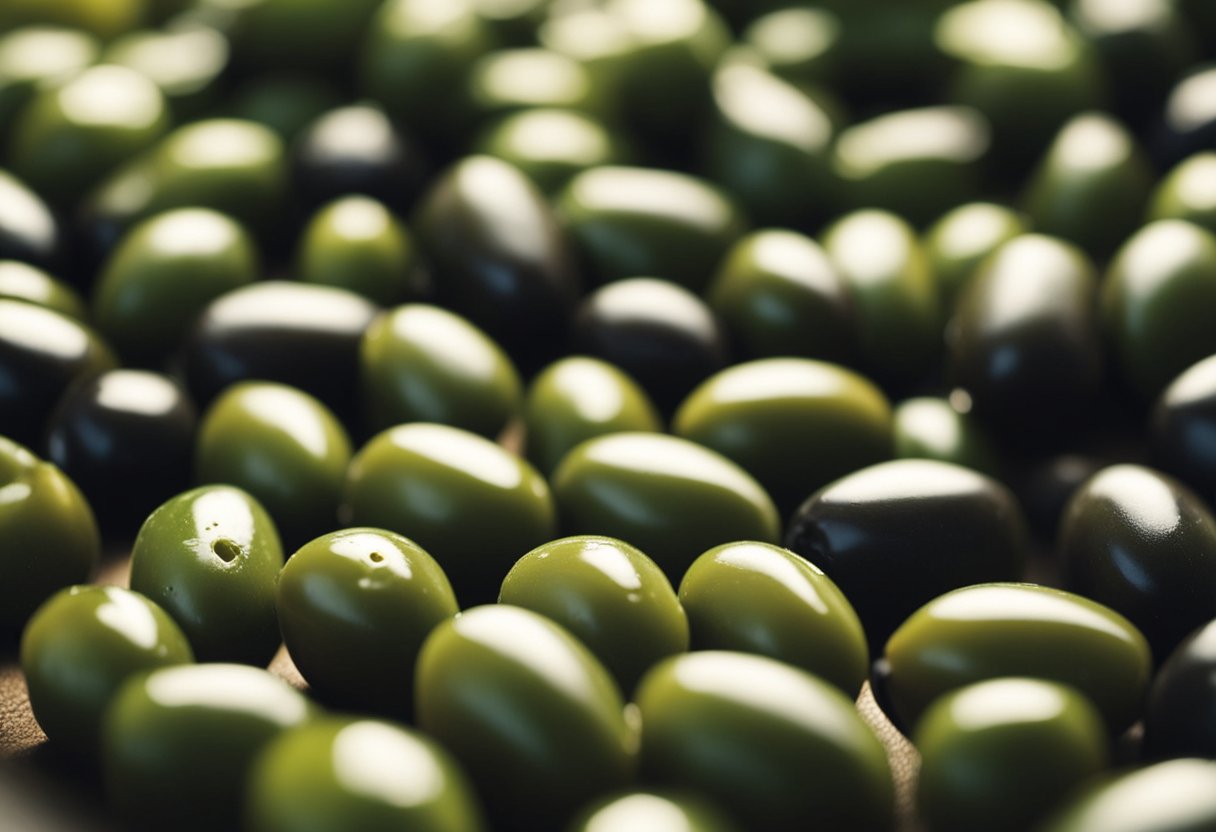
As someone who has tasted olives before, I can confidently say that they have a unique taste and texture. Olives can be described as both bitter and savory, with a slightly sweet undertone.
The taste of olives can vary depending on the type of olive and how it is prepared. For example, green olives tend to have a more bitter taste, while black olives are milder and have a more savory flavor.
In terms of texture, olives are firm and slightly chewy. They have a smooth, oily surface that can be slightly slippery to the touch.
The texture of olives can also vary depending on their ripeness. Unripe olives tend to be firmer and more bitter, while ripe olives are softer and have a milder flavor.
When it comes to culinary uses, olives are a versatile ingredient that can be used in a variety of dishes.
They are often used in Mediterranean cuisine, such as in salads, pasta dishes, and as a topping for pizza. Olives can also be used to make olive oil, which is a staple in many cuisines around the world.
Overall, olives have a unique taste and texture that can add depth and flavor to many dishes.
Whether you love them or hate them, there’s no denying that olives are a distinctive ingredient that can add a lot of character to any meal.
Harvesting and Processing of Olives
Harvesting olives is a delicate process that requires careful attention to the ripeness of the fruit. Olives can be harvested when they are green and unripe, fully ripened to black, or any stage in between.
The timing of the harvest will depend on factors such as the region, the variety of olive, and the desired ripeness of the olives.
In the Northern Hemisphere, olives are typically picked from late September to mid-November, while in the Southern Hemisphere, harvesting goes from April to July.
Once harvested, olives must be treated to remove the bitter compound oleuropein, which is found in the leaves and fruit of the tree.
There are several methods for treating olives, including water, salt, brine, and fermentation. The treatment method used will depend on the desired taste and texture of the final product.
One of the easiest and quickest ways to cure olives at home is with water. To do this, the olives are soaked in water for several days, with the water changed daily.
This process removes the bitterness from the olives and results in a mild, slightly salty flavor.
Another common method of curing olives is with salt. The olives are packed in salt for several weeks, which draws out the bitterness and preserves the olives.
This method results in a salty, wrinkled product that is commonly used in Mediterranean cuisine.
Brine curing is another popular method of treating olives. The olives are soaked in a solution of water, salt, and vinegar for several weeks, resulting in a tangy, slightly sour flavor.
Fermentation is a traditional method of curing olives that involves packing them in salt and allowing them to ferment for several months.
This method results in a tangy, slightly sour flavor and is commonly used in Greek and Middle Eastern cuisine.
Once the olives have been cured, they can be processed into a variety of products, including olive oil, tapenade, and pickled olives.
The processing method used will depend on the desired final product, but typically involves crushing the olives and separating the oil from the pulp.
In conclusion, olives are a fruit that require careful attention to the ripeness of the fruit during the harvesting process.
Once harvested, they must be treated to remove the bitterness and can be cured using various methods, including water, salt, brine, and fermentation.
The final product can be processed into a variety of products, including olive oil, tapenade, and pickled olives.
Nutritional Value of Olives
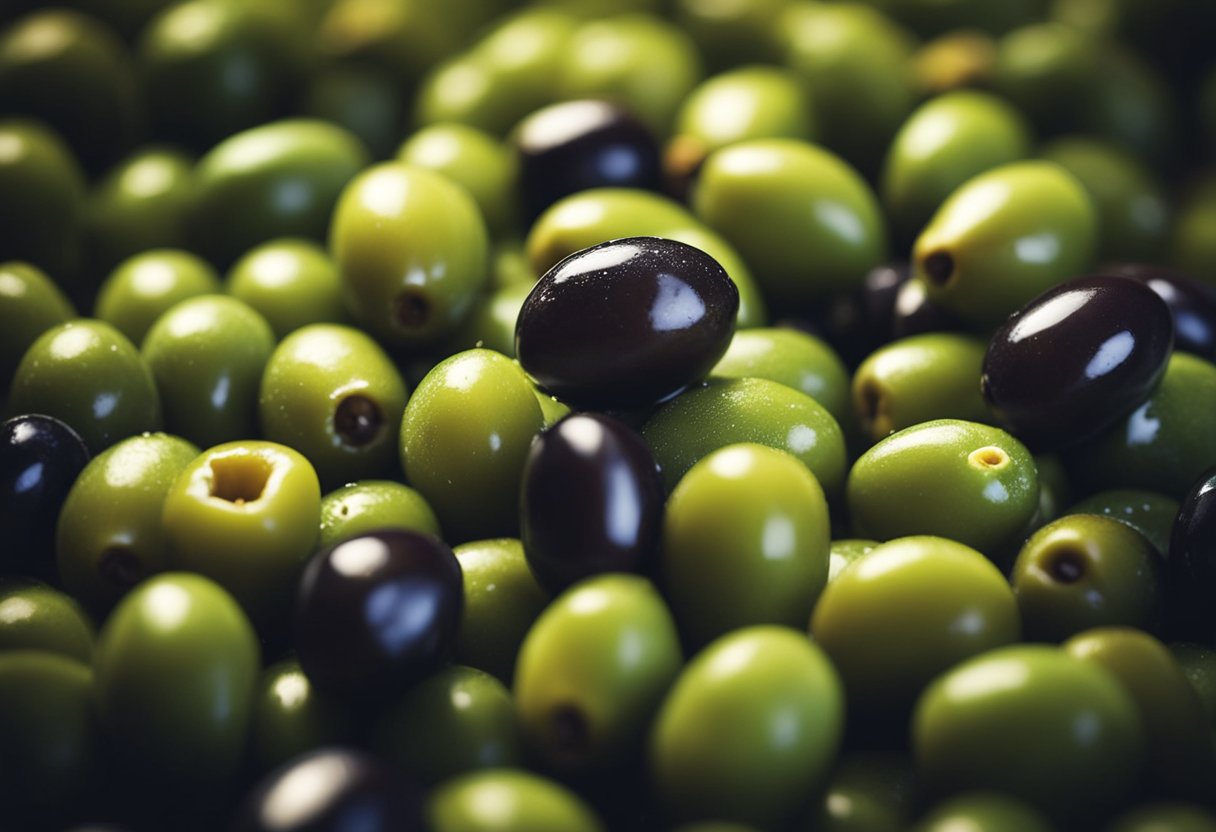
Olives are a fruit that are widely consumed around the world. They are known for their distinctive taste and nutritional value.
Olives are a good source of healthy fats, fiber, and antioxidants. They are also low in calories and contain a range of vitamins and minerals.
One of the key nutrients in olives is fat. Olives are high in monounsaturated fats, which are considered to be healthy fats.
These fats have been linked to a range of health benefits, including a reduced risk of heart disease. Olives also contain a small amount of saturated fat.
Olives are also a good source of fiber. Fiber is an important nutrient that helps to keep the digestive system healthy.
It can also help to reduce cholesterol levels and promote feelings of fullness. Olives contain both soluble and insoluble fiber.
In addition to healthy fats and fiber, olives are also a good source of a range of vitamins and minerals. They are particularly high in vitamin E, which is an important antioxidant.
Antioxidants help to protect the body from damage caused by free radicals. Olives are also a good source of iron, calcium, and sodium.
Olives are also a good source of oleic acid and tyrosol. Oleic acid is a type of monounsaturated fat that has been linked to a range of health benefits, including a reduced risk of heart disease.
Tyrosol is an antioxidant that has been shown to have anti-inflammatory properties.
Overall, olives are a nutritious and healthy food that can be enjoyed as part of a balanced diet. They are low in calories and high in a range of important nutrients, including healthy fats, fiber, and antioxidants.
Olives in the Mediterranean Diet
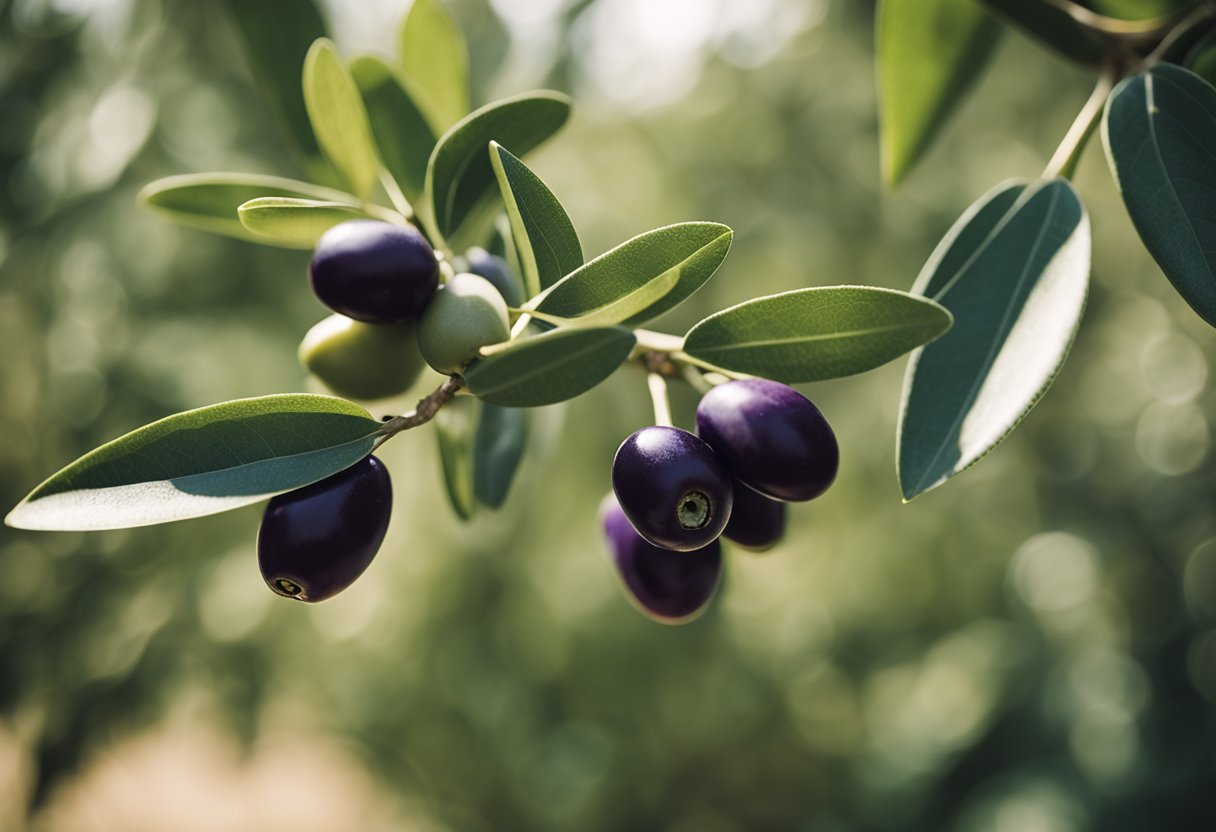
As someone who has followed the Mediterranean diet for years, I can confidently say that olives are a staple in this way of eating.
Olives have been a part of the Mediterranean diet for thousands of years and are a key ingredient in many dishes, including pizza, salads, and tapenade.
One of the reasons olives are so popular in the Mediterranean diet is their versatility. They can be eaten on their own as a snack, added to salads for a burst of flavor, or used to make tapenade, a delicious spread that can be used on bread or crackers.
Another reason olives are so popular in the Mediterranean diet is their health benefits. Olives are a great source of healthy fats, which can help reduce the risk of heart disease and stroke.
They are also a good source of fiber, which can help keep you feeling full and satisfied.
When it comes to cooking with olives, many people prefer to use virgin olive oil. This type of olive oil is made by cold-pressing the olives, which helps retain their natural flavor and nutrients.
Virgin olive oil is a key ingredient in many Mediterranean dishes and is often used in place of other types of oil.
In conclusion, olives are an important part of the Mediterranean diet. They are versatile, delicious, and packed with health benefits. Whether you eat them on their own or use them in your cooking, olives are a great addition to any diet.
Health Benefits of Olives
As a fruit, olives offer numerous health benefits. Olives are high in monounsaturated fats, which can help lower LDL (bad) cholesterol levels in the blood.
According to a study published in the Journal of the American College of Cardiology, consuming a Mediterranean diet rich in monounsaturated fats, such as those found in olives, can reduce the risk of heart disease by 30%.
Olives also contain antioxidants, which can help protect against cancer and other diseases.
The phytonutrients found in olives have been shown to reduce inflammation in the body, which can help prevent chronic diseases such as osteoporosis and cancer.
In addition, olives are a good source of fiber, which can help regulate digestion and reduce the risk of colon cancer.
A half cup of olives contains about 1.5 grams of fiber. Olives are also low in saturated fat, which can help reduce the risk of heart disease.
It’s important to note that olives are high in sodium, so it’s important to consume them in moderation. One serving of olives (about 10 olives) contains about 115-145 calories, depending on the variety.
Overall, olives are a healthy and delicious addition to any diet.
Olives Around the World
I’ve always been fascinated by the versatility of olives. They are used in a variety of cuisines around the world, and each country has its own unique way of preparing them.
Here are some interesting facts about olives in different parts of the world.
Greece
Greece is famous for its Kalamata olives, which are dark purple in color and have a rich, fruity flavor. They are often used in salads and as a topping for pizza.
In Greece, olives are also used to make olive oil, which is a staple of the Mediterranean diet.
Spain
Spain is the largest producer of olives in the world, and it is home to a wide variety of olive trees. Some of the most popular types of olives in Spain include Manzanilla, Hojiblanca, and Picual.
Spanish olives are often marinated in garlic, herbs, and olive oil, and served as a snack or appetizer.
Italy
Italy is known for its flavorful green and black olives, which are often used in pasta dishes and antipasti platters.
Some of the most popular Italian olives include Taggiasca, Castelvetrano, and Cerignola. In Italy, olives are also used to make olive oil, which is a key ingredient in many Italian recipes.
Turkey
Turkey is another country that is known for its olives, particularly the Gemlik variety. These olives are small and black, with a slightly bitter taste.
In Turkey, olives are often served as a side dish, and they are also used to make olive oil.
Morocco
Morocco is home to a unique variety of olives called Picholine, which are small and green with a slightly tart flavor.
They are often used in Moroccan tagines and salads. In Morocco, olives are also used to make olive oil, which is an important ingredient in traditional Moroccan cuisine.
Overall, olives are a beloved ingredient in many different cultures around the world. Whether you prefer them marinated, stuffed, or simply eaten on their own, there is no denying the versatility and deliciousness of this fruit.
Culinary Uses of Olives
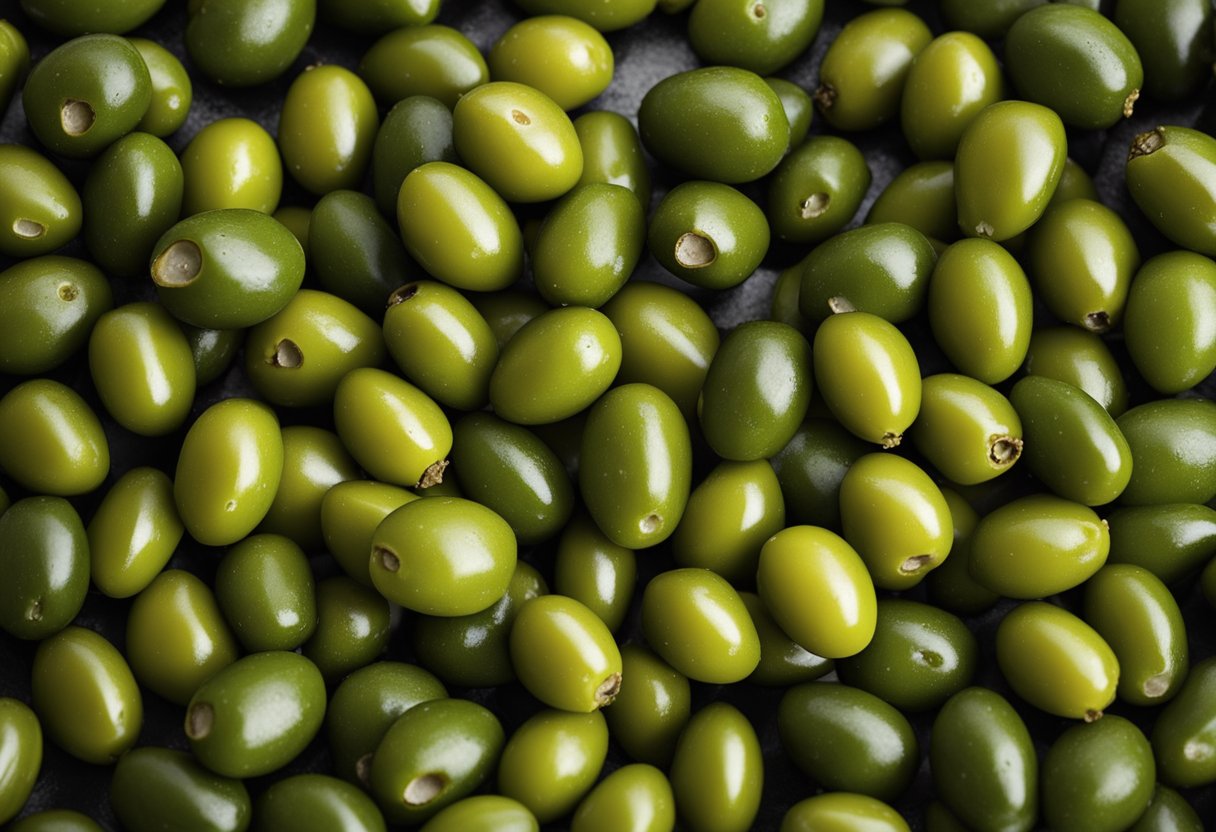
Olives are a versatile ingredient in the culinary world, offering a unique flavor and texture to a variety of dishes.
As a primary source of olive oil, olives are used in many recipes to provide flavor and health benefits. Here are some of the most popular culinary uses of olives:
Olive Oil
Olive oil is a cornerstone in many recipes, from salad dressings to sautéing vegetables. It is also used in baking and frying.
The unique taste of olive oil comes from the olives themselves, which are pressed to extract the oil. Extra virgin olive oil is the highest quality and is made from pure, cold-pressed olives.
Pizza
Olives are a popular topping for pizza, adding a salty and savory flavor. Black olives are commonly used on pizza, but green olives can also be used for a different taste.
Olives can be sliced or chopped and used as a topping on their own or combined with other toppings like cheese, tomatoes, and peppers.
Salads
Olives are a perfect topping for salads, adding flavor and texture. They can be sliced or chopped and added to green salads, pasta salads, and more.
Kalamata olives are a popular choice for Greek salads, while green olives are commonly used in Caesar salads.
Tapenade
Tapenade is a delicious paste made from olives, capers, and olive oil. It can be used as a spread on bread or crackers, or as a topping for fish or chicken.
Tapenade is easy to make at home and can be customized with different types of olives and seasonings.
Recipes
Olives can be used in a variety of recipes, from appetizers to main dishes. They can be stuffed with cheese or other fillings for a tasty snack, or used in sauces and marinades.
Olives can also be used in Mediterranean-inspired dishes like pasta, couscous, and tagines.
In conclusion, olives are a versatile ingredient in the culinary world, offering a unique flavor and texture to many dishes. From olive oil to pizza toppings, olives are a staple in many recipes.
Frequently Asked Questions
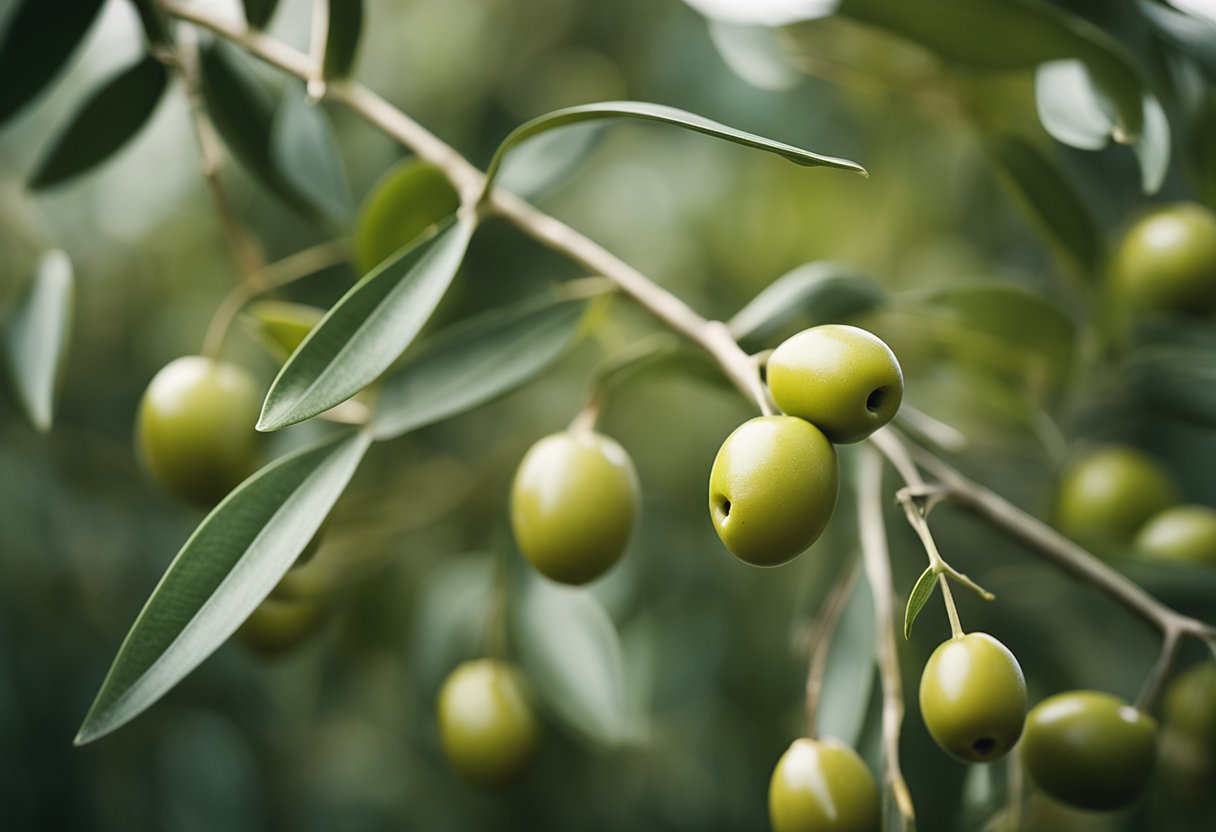
What are the nutritional benefits of olives?
Olives are a good source of healthy fats, fiber, and antioxidants. They contain monounsaturated and polyunsaturated fats that can help reduce the risk of heart disease and lower cholesterol levels.
Olives also contain vitamin E, iron, and calcium, which are essential for maintaining healthy bones and skin.
Can consuming olives have negative side effects?
While olives are generally safe to consume, they are high in sodium, which can cause water retention and increase blood pressure in some people.
Additionally, some people may be allergic to olives and experience symptoms such as itching, swelling, or difficulty breathing.
How many olives should be consumed daily?
There is no specific recommendation for how many olives should be consumed daily. However, it is important to keep in mind that olives are high in sodium and calories, so it is best to consume them in moderation.
Do olives have an impact on sexual health?
There is no scientific evidence to suggest that olives have any impact on sexual health.
Are olives classified as a fruit or vegetable?
Olives are classified as a fruit because they come from the ovary of a plant, which is found in the bulb of the flower.
Are green or black olives healthier?
Both green and black olives are healthy and nutritious. However, black olives contain more iron and vitamin E than green olives.
Additionally, black olives are usually riper than green olives, which means they contain more monounsaturated fats and are softer in texture.







